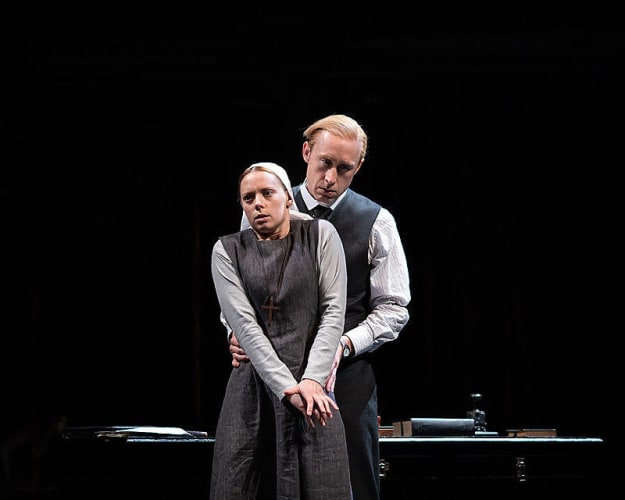A perennial problem play with, one might think, little bearing on a modern society enjoying sexual freedom and equality, but #MeToo resonates.
Director Gregory Doran resets the difficult tale of sin and subjugation of women, power, corruption and double standards to 1900 Vienna where sumptuous ballroom and whirling waltz are purely the glossy veneer on a rotten state.
With morals crumbling and the city in strife under his watch, the Duke (Anthony Bryne) hands over the mess to his cold fish deputy and, for reasons forever unfathomable, lurks about in disguise to watch what happens, meddle and inflict pain and double-bluff somewhat callously. Hmm.
Meanwhile, Sandy Grierson’s slurkily pious Angelo reveals a steely determination, spiked cilice garter and lust for more than power as he tackles society’s seedy underbelly, unleashing the full weight of the law upon pimps, lechers and fornicators.
But “with what judgment ye judge, ye shall be judged: and with what measure ye mete, it shall be measured to you again” comes home to bite him in the tightly clenched proverbial as he condemns to death one Claudio (James Cooney) whose betrothed is shortly to birth evidence of their moral turpitude.
Sometimes labelled a comedy, slapstick bawdy scenes, a fabulously foppish and louche Lucio (Joseph Arkley), garrulous Pompey (David Ajao), tour de force madame Mistress Overdone (Graeme Brookes), malaprop Elbow (Michael Patrick) and farting gaolbird Barnadine (Brookes again) add colour and pace to the otherwise drear unfolding of Angelo’s foul offer.
But as dismal and bleak as the bargaining for the life of a brother and the vile price of reprieve may be, the strength of the production lies in the interaction between the emotionally repressed protagonists. Grierson makes believable the about-turn of the icy, aloof pretender while Lucy Phelps as novice Isabella convincingly embodies the struggle between the profane and the sacred, with no voice or credibility in a society where women are subjugated (even when women sit in high places—hence, presumably, the motivation for the gender swap of Escalus) and whose allegations will not be believed.
Phelps’s Isabella hints of past outrage, repressed history and her final reaction speaks volumes for women seen as possessions for whom marriage and wealth is expected to be the ultimate goal, even when the proposer is 'not that way inclined'.
Stephen Brimson Lewis’s sets are towering façades with projected scenes to move the action or mirrored screens speaking of constant voyeurism while Simon Spencer’s lighting throws much of the stage into shadow reflecting the Bard’s difficult tale of shade and light.
